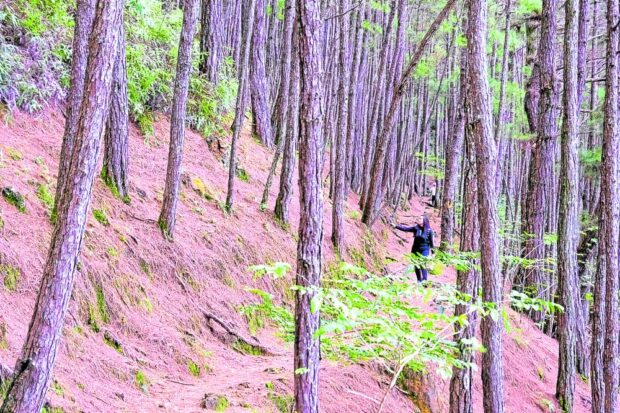Split of Baguio barangays from John Hay under way

FOREST BATHING Camp John Hay retains Baguio City’s largest forest cover, which tourists can visit by hiking through trails developed by its former administrator, the US military. —NEIL CLARK
ONGCHANGCO
BAGUIO CITY—The government has set in motion the segregation of communities thriving within the 625-hectare Camp John Hay reservation, including Baguio’s biggest forestland, 30 years after making that promise to Baguio residents.
Officials of the Bases Conversion and Development Authority (BCDA), the agency that controls all former American baselands, informed the city council during its session on Monday that they processed the documents required to separate four of the 13 Camp John Hay barangays from BCDA jurisdiction.
The exclusion of Camp John Hay settlements is one of 19 conditions set by Baguio in 1994 before it endorsed the commercialization of this former American rest and recreation baseland.
But the process will require congressional approval, according to a BCDA team led by Richard Brian Cepe, vice president for land and assets development, and Jocelyn Caniones, vice president for corporate planning.
A quicker way would be a segregation law benefiting all of the Camp John Hay barangays, according to Baguio Rep. Marquez Go, noting that he is preparing to sponsor that measure.
Article continues after this advertisementBut at the request of Mayor Benjamin Magalong who attended the session with Go, the city council filed a resolution asking the BCDA Board of Directors to divulge its position regarding the conditions imposed by Baguio, and to explain how it intends to fulfill them.
Article continues after this advertisementBCDA accepted the conditions enumerated in 1994 through City Council Resolution No. 362, before the city allowed the government to lease 288 ha of what is now the John Hay Special Economic Zone.
In 1996, a 25-year lease agreement was won by a consortium that put up a golf course, log homes and hotels before the contract was voided by a 2015 arbitral ruling because of a prolonged feud with BCDA.
Conditions
The baseland administrator, however, qualified that it would abide by these conditions “for as long as they do not contradict laws,” like Republic Act No. 7227 (the BCDA law), during the council’s April 5, 2021 session. These conditions include shares from Camp John Hay rentals and the recognition of ancestral land claims.
BCDA said it had submitted the subdivision plans for Barangay Hillside to the Land Registration Authority, as well as its barangay master development plan, which is now required.
Hillside segregation would benefit 39 residents, according to the 2019 president’s report of BCDA estate manager John Hay Management Corp. (JHMC).
BCDA said it was completing the development plans and other documents of three more villages: Greenwater, Upper Dagsian and Country Club Village.
READ: Baguio asks Congress to undo John Hay’s segregation from city
According to the JHMC report, BCDA prioritized barangays that have no legal impediments nor controversies, before it proceeds with Barangays Camp 7, Happy Hollow, Loakan-Apugan, Loakan-Liwanag, Loakan Proper, Lower Dagsian, Lucnab, Military Cut-Off and Sta. Escolastica Village. Some barangays are barely inside Camp John Hay territory and only 10 houses would need to be segregated in one village, the council was told.
A 14th village, Scout Barrio, was segregated in 2001 as a socialized housing area. But while its 115 households were granted titles, Scout Barrio’s institutional properties like its roads, the John Hay Elementary School and even its barangay hall are still under the control of BCDA.
Legitimate titles
Councilor Michael Lee Lawana, the association of barangay councils representative to the council who serves as chair of Lower Dagsian at Camp John Hay, said the BCDA could speed up the segregation process for three more barangays if it would only accept the Certificates of Ancestral Land Titles granted to Ibaloy households and Baguio’s only Certificate of Ancestral Domain Title at Happy Hollow.
“These are legitimate titles issued by a government agency (the National Commission on Indigenous Peoples) which recognized that we (Ibaloys) have dwelt inside John Hay since time immemorial. Don’t you all belong to the same government?” Lawana said.
BCDA has pending lawsuits before the Supreme Court to nullify all ancestral land titles inside Camp John Hay, arguing that it was not consulted despite the fact that it alone had patented and custodial rights over the former baseland.
Councilor Jose Molintas, a lawyer, said the separation of these barangays should be treated by the government as an act of social justice, and not a means to pacify Baguio.